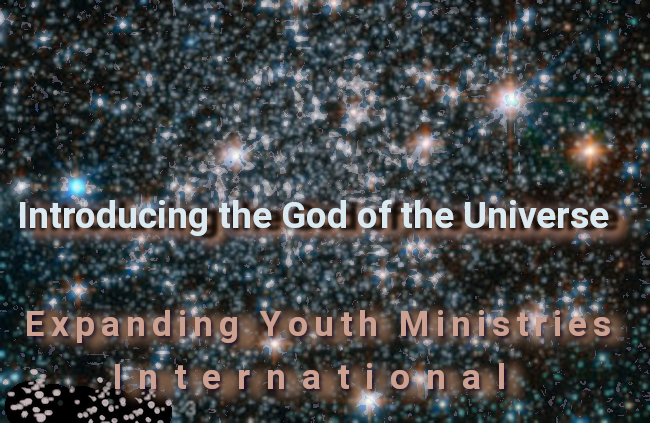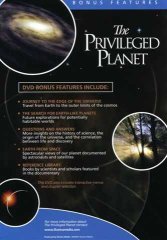
Declare His glory among the nations, His wonders among all peoples.
(1 Chronicles 16:24 nkjv)
The Privileged Planet

The Privileged Planet, by Ilustra Media Presents the Search For Purpose in the Universe.
A. Play Program: Spectacular 1 hour Video
B. Chapter Search: (see titles and times below)
C. Special Bonus DVD Features: (more than 40 minutes of extras)

C. Special Bonus Features: ( 32 min live video and 47 photos plus text & refs.)
* Journey to the Edge of the Universe: Video trip through space with commentary. (6:55)
* The Search for Earth-Life Planets: Text & video interview (4:20) & 13 text & photo slides.
* Questions and Answers: Excellent material; video interviews with notable scientists:
1. Does the monotheistic tradition of an intelligible universe have any impact on modern science? (1:17)
2. What is the "Great Copernican Cliche"? (1:37)
3. Is there any connection between the beliefs of Nicholas Copernicus and the Copernican Principle? (1:05)
4.What is the Kalam Cosmological Argument? (1:09)
5.All of the galaxies in the universe are receding from each other. What are the implications of this fact? (1:02)
6.Astronomer Robert Jastrow discusses his views on the origin of the universe. (1:30)
7.What is meant by the idea of a universe fine-tuned for life? (1:45)
8.What are the primary naturalistic explanations for the fine-tuning of the universe? (2:23)
9.From a scientific perspective, what are the problems with the hypothesis of multiple universes? (0:35)
10.If life is discovered somewhere else in the universe, is it likely to be carbon based? (1:10)
11.What objections has the hypothesis of a correlation between complex life and scientific discovery received? (2:13)
12.In what sense is Earth optimized for scientific discovery? (1:43)
13.Is the hypothesis of a correlation between life and discovery based upon empirical evidence or metaphysical philosophy? (1:12)
14.Will there be future opportunities to test this hypothesis? (0:56)
15.research scientist Candice Hansen (the first person to see the famous Voyager pictures of Earth) describes her experience. (1:53) (Total Q & A time = 21:30)
* Earth from Space: 47 Spectacular and stunning photos of Earth from space!
* Reference Library:
The Privileged Planet: Jay Richards & Guillermo Gonzolez
The Book of the Cosmos: Dennis R. Danielson
The Case for a Creator: Lee Strobel
God and the Astronomers: Robert Jastrow
The Mind of God: Paul Davies
Rare earth: Peter Ward 7 Donald Brownlee
"The most habitable places in the universe also offer the best opportunity for scientific discovery. I believe this implies purpose." Guillermo Gonzolez - Astrobiologist
Many scientists have claimed that Earth is an ordinary speck of dust adrift, without purpose or significance, in a vast cosmic sea. Yet current astronomical evidence seems to suggest just the opposite.
We now know that a rare and finely tuned array of factors makes Earth suitable for complex life. We depend on our planet's oxygen-rich atmosphere, its large moon, its planetary neighbors, and its precise location within our solar system and Milky way galaxy. But there is more. The same factors that that make a planet like Earth hospitable for life also provide the best conditions for scientific discovery.
Through stunning computer animation, interviews with leading scientists and spectacular images of Earth and the cosmos, The Privileged Planet explores a startling connection between our capacity to survive and our ability to observe and understand the universe.
Is this correlation merely a coincidence? Or does it point to a deeper truth about purpose and intelligent design within the cosmos?
Narrated by John Rhys-Davies (The Lord of the Rings)
2. What is the "Great Copernican Cliche"? (1:37)
3. Is there any connection between the beliefs of Nicholas Copernicus and the Copernican Principle? (1:05)
4.What is the Kalam Cosmological Argument? (1:09)
5.All of the galaxies in the universe are receding from each other. What are the implications of this fact? (1:02)
6.Astronomer Robert Jastrow discusses his views on the origin of the universe. (1:30)
7.What is meant by the idea of a universe fine-tuned for life? (1:45)
8.What are the primary naturalistic explanations for the fine-tuning of the universe? (2:23)
9.From a scientific perspective, what are the problems with the hypothesis of multiple universes? (0:35)
10.If life is discovered somewhere else in the universe, is it likely to be carbon based? (1:10)
11.What objections has the hypothesis of a correlation between complex life and scientific discovery received? (2:13)
12.In what sense is Earth optimized for scientific discovery? (1:43)
13.Is the hypothesis of a correlation between life and discovery based upon empirical evidence or metaphysical philosophy? (1:12)
14.Will there be future opportunities to test this hypothesis? (0:56)
15.research scientist Candice Hansen (the first person to see the famous Voyager pictures of Earth) describes her experience. (1:53)
(Total Q & A time = 21:30)
* Earth from Space: 47 Spectacular and stunning photos of Earth from space!
* Reference Library:
The Privileged Planet: Jay Richards & Guillermo Gonzolez
The Book of the Cosmos: Dennis R. Danielson
The Case for a Creator: Lee Strobel
God and the Astronomers: Robert Jastrow
The Mind of God: Paul Davies
Rare earth: Peter Ward 7 Donald Brownlee
"The most habitable places in the universe also offer the best opportunity for scientific discovery. I believe this implies purpose." (Guillermo Gonzolez - Astrobiologist)
"Many scientists have claimed that Earth is an ordinary speck of dust adrift, without purpose or significance, in a vast cosmic sea. Yet current astronomical evidence seems to suggest just the opposite. We now know that a rare and finely tuned array of factors makes Earth suitable for complex life. We depend on our planet's oxygen-rich atmosphere, its large moon, its planetary neighbors, and its precise location within our solar system and Milky way galaxy. But there is more. The same factors that that make a planet like Earth hospitable for life also provide the best conditions for scientific discovery.
Through stunning computer animation, interviews with leading scientists and spectacular images of Earth and the cosmos, The Privileged Planet explores a startling connection between our capacity to survive and our ability to observe and understand the universe.
Is this correlation merely a coincidence? Or does it point to a deeper truth about purpose and intelligent design within the cosmos?
(Narrated by John Rhys-Davies (The Lord of the Rings)